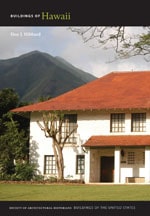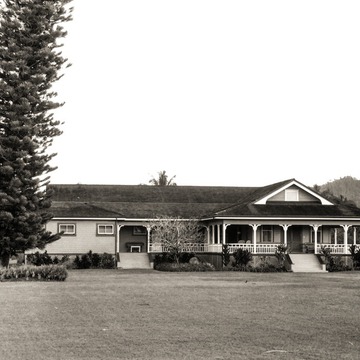The largest and most prominent of the historic beach cottages along Hanalei Bay, the single-story Wilcox beach cottage sits in the midst of a seventeen-acre lawn, looking out across Weke Road to Hanalei Bay. A rare and splendid, late-nineteenth-century residence, the house is admirably suited to Hawaii, with its deep, wraparound lanai and rambling, asymmetrical plan. The living room's high ceilings help alleviate heat, and double pocket doors open three sides of the room to easy access and ventilation. The separate kitchen to the rear is another common nineteenth-century hallmark, which has all but disappeared from the Island scene. It is connected to the living room via a lanai, which serves as an exterior hall accessing the side and rear bedroom wings, providing separation of social, cooking, and sleeping functions. The orientation to the outdoors, and the lanai's capacious living space, as well as the numerous and commodious openings for ventilation and light, attest to the owners' understanding of the location and well represent a lifestyle enjoyed in Hawaii. A. S. Wilcox was the fourth son of missionaries Abner and Lucy Wilcox. He grew up at Waioli and was educated at Punahou School in Honolulu. From 1877 to 1898, he managed Lihue Plantation's lands at Hanamaulu and owned much of Princeville and Hanalei, having tried unsuccessfully to develop this area for sugar as well. He also served as president of C. Brewer. In 1898, he married Emma Kauikeolani Napoleon Mahelona. The house remains a private residence and vacation rental.
You are here
Albert Spencer Wilcox Beach Cottage
If SAH Archipedia has been useful to you, please consider supporting it.
SAH Archipedia tells the story of the United States through its buildings, landscapes, and cities. This freely available resource empowers the public with authoritative knowledge that deepens their understanding and appreciation of the built environment. But the Society of Architectural Historians, which created SAH Archipedia with University of Virginia Press, needs your support to maintain the high-caliber research, writing, photography, cartography, editing, design, and programming that make SAH Archipedia a trusted online resource available to all who value the history of place, heritage tourism, and learning.















